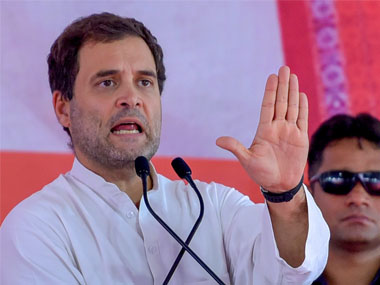Rahul Gandhi’s purported brainchild Nyuntam Aay Yojana (NYAY) promising 20 percent of the poorest households in India a direct transfer of Rs 72,000 every year would entail a massive Rs 3.6 lakh crore to the exchequer, close to half the current fiscal deficit. Fiscal deficit represents deficit financing i.e. printing of currency notes mindlessly unwarranted by the economic fundamentals particularly growth. It inevitably leads to inflation with too much money chasing too few goods and services. In the event, should Congress form the next government at the centre and live up to its promise of NYAY, there could be two consequences—- heightened deficit financing setting off hyperinflation that would hit the poor more in view of their innate vulnerability thus rendering a substantial part of the Rs 72,000 dole woefully inadequate. The other alternative is the return of the era of high taxes. The Narender Modi government has just spared those earning Rs 5 lakh or less from income tax. Now willy-nilly they will be brought back into the income tax net. There is very little tail room to tax the rich including the super-rich unless Congress deigns to tax the capital market fully at par with other income, brings back wealth tax targeting all assets with a stiff rate of 2 percent to 3 percent and revives estate duty on the rich. [caption id=“attachment_5327781” align=“alignleft” width=“380”] File image of Congress president Rahul Gandhi. PTI[/caption] Taxing the rich heavily to tend to the poor is all about Robinhood taxation. But that is easier said than done for the fear of them losing interest in investments thus aggravating the unemployment problem. The grim bottom line therefore is the salaried class and the middle class would again bear the brunt. Congress thus could lose at the roundabout what it has perhaps won at the swing—the people at the bottom of the heap may gravitate towards it at the hustings but the middle-class sensing hyperinflation or return of higher taxes would turn its back on the party with vengeance. Finland which has just completed the two-year trial period of 560 Euros per month to the unemployed has had a chastening experience—while the happiness and well-being levels of the unemployed have increased in the happiest country in the world, the unemployed haven’t warmed up to the idea of
seeking jobs despite the guarantee that the dole won’t be stopped even if an unemployed person gets a job. The Congress party would do well to learn from the Finnish experience instead of trying to reinvent the wheel. All parties in India at the end of the day should heed the Scottish proverb—don’t give fish, teach how to fish. It is unemployment, silly, that causes all sorts of unrest. An indolent society fattened by doles is a virtual powder keg. Even the former Chief Economic Adviser Arvind Subramanian’s universal basic income support model was flawed. Vide economic survey 2018, he had made a case for universal basic income scheme in lieu of the thousand of the extant welfare and subsidy schemes that further had the knack of mushrooming every year dangerously. The flaws were two-fold—-why should the well-heeled be paid doles especially given the fact that such doles, in any case, are going to be paid from out of the taxes collected from them. What is the point in returning to the taxpayers what they had paid as taxes back as dole? Secondly, a subsidy of which direct transfer is a variant should be targeted and not spread thin. (The author is a senior columnist and tweets @smurlidharan)
Narender Modi government spared those earning Rs 5 lakh or less from income tax. If NYAY is implemented they will be brought back into the income tax net
Advertisement
End of Article


)

)
)
)
)
)
)
)
)



